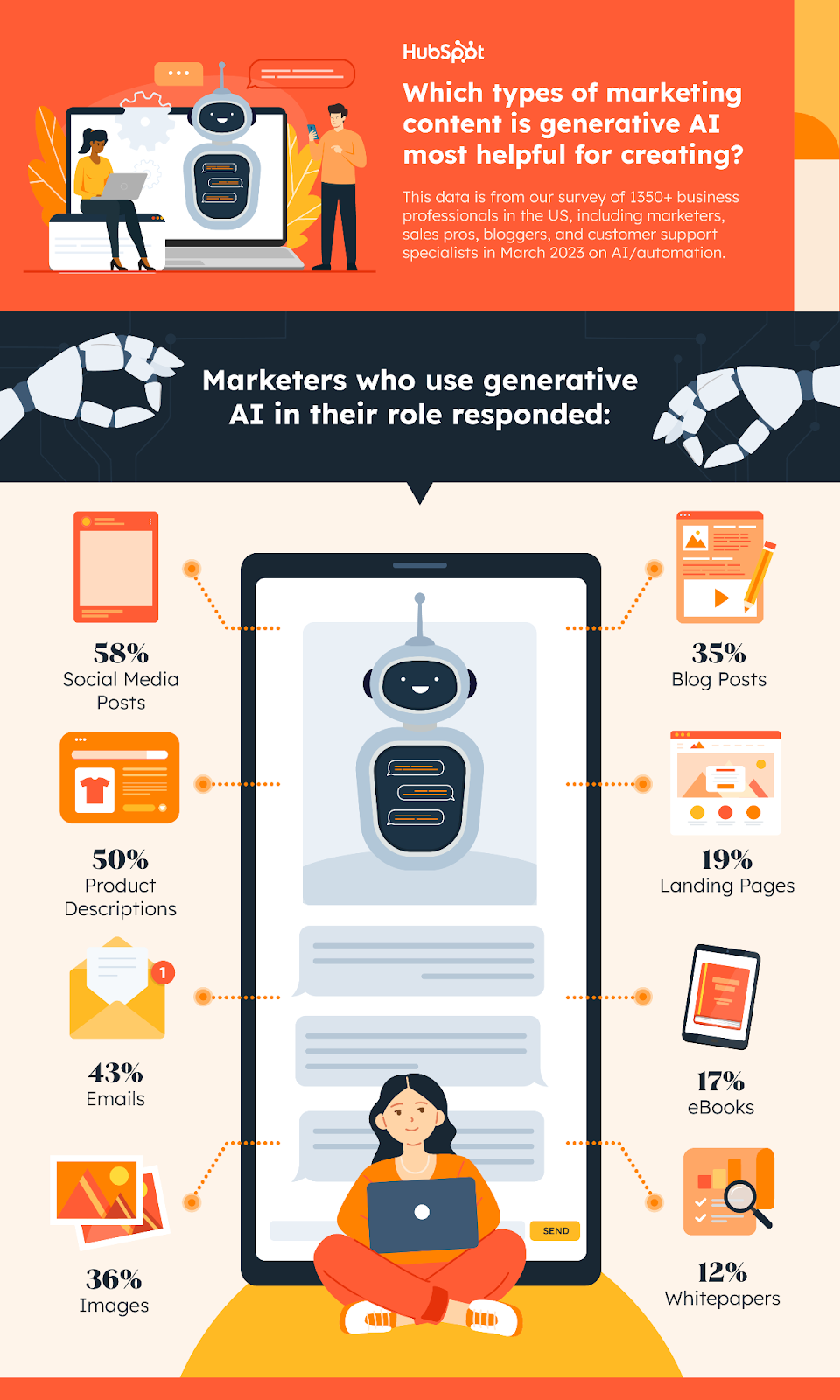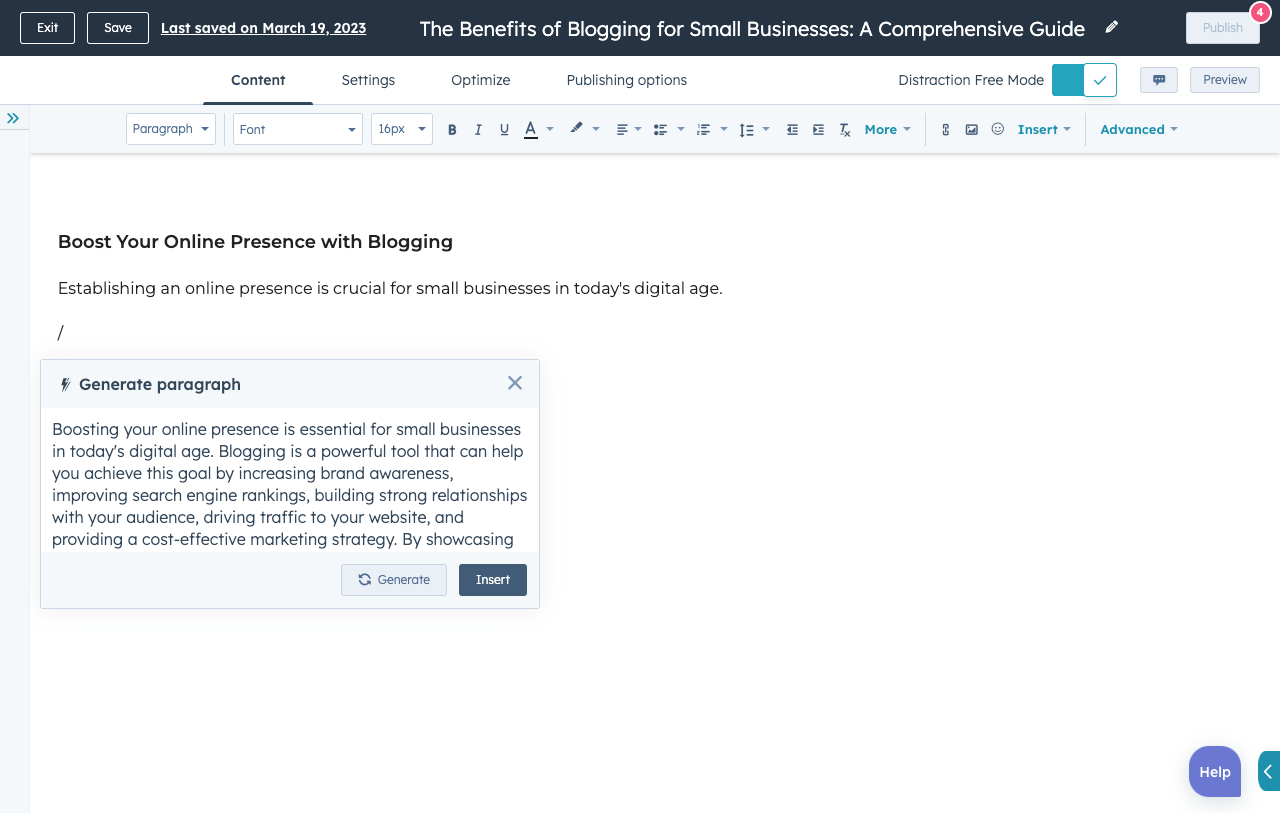Thanks to the advancements in artificial intelligence technology, content generation doesn’t have to be a headache-inducing task. As AI increasingly takes over manual content production tasks, it’s wise for marketers to understand the different types of AI-generated content that exist — and which benefit the most from it.

These tools can help us produce high-quality content appealing to your audience and on-brand. In this blog post, we’ll explore the top types of AI-generated content in marketing. By leveraging these types of content, you can elevate your content strategy and gain a competitive edge in the market.
Free Guide: How to Use AI in Content Marketing
[Download Now]
And to help understand, we pulled data from HubSpot’s own State of AI surveydata to find out the top types of AI-generated content in marketing for 2023. The following are statistics drawn from 1350+ U.S. marketers — specifically those already leveraging artificial intelligence in their roles.
Top Content Types for Generative AI
- Social Media Posts
- Product Descriptions
- Emails
- Images
- Blog Posts
- Landing Pages
- Ebooks
- Whitepapers

1. Social Media Posts (58%)
The most popular use for marketers leveraging AI for content is for social media posts, and with good reason.
Social media marketers have to make content they hope their audience will enjoy, and using a content assistant makes managing a social media calendar much easier. Marketers can use AI for social media posts:
- Content Creation: AI tools can help generate content ideas, suggest topics, and even write headlines for social media posts. In fact, 35% of surveyed marketers use AI to get ideas or inspiration.
- Scheduling and Posting: AI-powered social media scheduling tools can help you automatically post your content at the most effective times, and even optimize your content for specific social media platforms.
- Audience Analytics: AI can help you better understand your audience through data analysis. This information can then be used to craft more effective and relevant social media posts.
2. Product Descriptions (50%)
50% of marketers who use generative AI found that the technology is helpful for product descriptions.
It can be challenging to find the words to describe new products, especially when you’re selling to an audience that doesn’t know the terminology as well as your team. Marketers can use artificial intelligence not only accurately to explain a product’s functionality and features but also in a way that’s accessible and clear to the general public.
3. Emails (43%)
43% of marketers that regularly use AI find it helpful for email marketing. Catching your customer’s attention through email subject lines is a challenge in itself, and even trickier to get them to click open. With the help of AI, marketers can improve their strategy through:
- Timing Optimization: AI tools can suggest the best time of the day and day of the week to send a particular email based on when the recipient is most likely to engage with the email. This can improve open rates, click-through rates (CTR), and conversions.
- Subject Line Generation: AI can generate effective and catchy subject lines by analyzing past email campaigns, and the subject line’s performance. If these tools can create grabby subjects, it could increase open rates.
- A/B Testing: AI can be used to conduct A/B testing, where two different versions of the same email are sent to a random portion of the audience, and performance is measured. Based on the results of this testing, the best-performing email variant can then be sent to the rest of the audience, to maximize desired metrics.
4. Images (36%)
Marketers have much to gain from using AI for images as 36% of marketers find it helpful for image creation. Regarding search engine optimization, images can improve your rank in the search engine, and add a more attention-grabbing element to your blog, social media posts, or even product staging.
5. Blog Posts (35%)
Over one-third of marketing professionals found artificial intelligence tools helpful for making blog posts. As a writer myself, one of the first thoughts I had when introduced to AI was how it could improve my writing process.
Some of the best uses for AI writing generators in blog posts are:
- Efficiency: Marketers can save time and resources by automating various aspects of blog post creation, such as topic generation, research, and even drafting. This technology can also reduce the time spent on menial tasks like formatting, proofreading, and optimizing content for SEO.
- Personalization: AI can analyze customer behavior, preferences, and browsing history to help target blog content to specific audiences. Personalizing blog posts can make the content more relevant to the audience, potentially increasing engagement and conversion rates.
For those looking to improve their blog content creation, look no further than HubSpot’s content assistant. This platform feature is a suite of free, AI-powered features that help you ideate, create, and share remarkable content — in a flash.

Get started with HubSpot’s AI tools
6. Landing Pages (19%)
Almost one-fifth of marketing professionals using AI find it helpful for landing pages. Many businesses underestimate the power of good or bad UX, and artificial intelligence can help to monitor and improve how customers navigate your page through the following means:
- A/B Testing: AI and machine learning algorithms can be used to analyze user behaviors and identify the most effective landing page elements. This allows marketers to create variations of the landing pages and run A/B testing to determine the most effective page layout and design, ultimately leading to higher conversion rates.
- Optimization: AI-aided analytics helps analyze website bounce times, load times, and other important data. These insights allow marketers to optimize the landing pages and improve the customer experience for better website engagement.
7. Ebooks (17%)
According to our survey, the second to last helpful type of content to make with AI are ebooks. While AI can help marketers streamline certain aspects of ebook creation, there may be better options. Here are some reasons why:
- Tone and style: Well-written ebooks require an understanding of the target audience and language used. AI language generation is good, but needs to catch up when identifying complex language nuances and preferences. In some cases, the tone can be misaligned with the target audience, hurting engagement and leading to readers rejecting the ebook’s content.
- Authenticity: Human readers expect an ebook to be authentic, insightful, and provide original thoughts. AI is missing the critical thinking and research that offer authentic perspectives.
- Legal Concerns: If marketers use artificial intelligence heavily for a published ebook, they could find themselves in hot water. AI tech companies can catch authors falsely claiming original work as their own, as there have been a rising number of lawsuits related to the popularization of the tools.
8. Whitepapers (12%)
The type of content that would benefit the least from artificial intelligence is whitepapers, according to survey data.
Whitepapers should provide unique insights and industry analysis on different subjects. While AI is good at pattern recognition and data analysis, it may not have the creativity and understanding of complex issues necessary to craft a high-quality whitepaper — so it probably can’t benefit marketers as much as the other content types.
Use AI Wisely for Your Marketing Content
AI-generated content is changing the game for marketers by revolutionizing the content creation process. From social media posts to landing pages, your team can enjoy a more efficient, personalized, and practical approach to content creation. Adapt and leverage the technology wisely in your content marketing strategies to stay ahead of the curve.